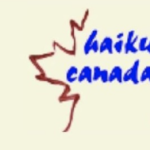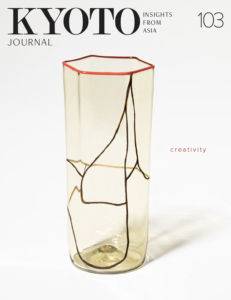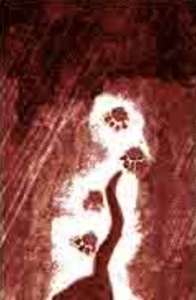Recent reviews of Tre Paesi and Other Poems, This Overflowing Light, Wintermoon, An Open Parenthesis, Waking to Snow, VOU: Visual Poetry, Tokio 1958–1978, and Kusudama:
Ian Brinton‘s marvellous review of Peter Makin‘s Tre Paesi and other Poems – ‘this new collection of remarkable poetry’ – has been published in Litter Magazine. Click here to read the review.
 For subscribers to Kyoto Journal, in the the latest issue there’s a review by Alan Botsford of Rin Ishigaki’s This Overflowing Light, translated by Janine Beichman. Here are some quotes: ‘In poem after poem, she offers resistance (to the weight of the past, to the weight of male dominance) and claims authority for herself.… She knows the truth about herself and all of us, as James Baldwin once said of poets.… She is a poet, indeed, of overflowing light. And with this generous, and generously translated, selection of Rin Ishigaki’s poems in English, readers may acquaint themselves with one of Japan’s most beloved and influential modern poets.’
For subscribers to Kyoto Journal, in the the latest issue there’s a review by Alan Botsford of Rin Ishigaki’s This Overflowing Light, translated by Janine Beichman. Here are some quotes: ‘In poem after poem, she offers resistance (to the weight of the past, to the weight of male dominance) and claims authority for herself.… She knows the truth about herself and all of us, as James Baldwin once said of poets.… She is a poet, indeed, of overflowing light. And with this generous, and generously translated, selection of Rin Ishigaki’s poems in English, readers may acquaint themselves with one of Japan’s most beloved and influential modern poets.’
 Jennifer Harrison has published a long and perceptive review of Robert MacLean‘s Wintermoon in Haiku Canada: ‘This new collection of sparse, astute poems distils more than twenty-five years of Robert MacLean’s thinking about what is essential in poetry.… MacLean’s mastery and innovative understanding of the haiku lens are immediately evident: one or two poems per page, simplicity of diction, each poem moving elegantly across the page, belying the intense contemplation of its conveyance through a language that is precise with unsaid evocation.… a voice on paper that responds to the … challenge [of] how to understand the simplicity of a landscape’s shapes and elemental rhythms, [and] how to carve away language from tradition to arrive at the meaning of such words as journey, breath and hearth. Click here to read the whole review.
Jennifer Harrison has published a long and perceptive review of Robert MacLean‘s Wintermoon in Haiku Canada: ‘This new collection of sparse, astute poems distils more than twenty-five years of Robert MacLean’s thinking about what is essential in poetry.… MacLean’s mastery and innovative understanding of the haiku lens are immediately evident: one or two poems per page, simplicity of diction, each poem moving elegantly across the page, belying the intense contemplation of its conveyance through a language that is precise with unsaid evocation.… a voice on paper that responds to the … challenge [of] how to understand the simplicity of a landscape’s shapes and elemental rhythms, [and] how to carve away language from tradition to arrive at the meaning of such words as journey, breath and hearth. Click here to read the whole review.
Kris Kosaka reviews An Open Parenthesis in the Japan Times, saying ‘While absorbing the rhythms of Philip Rowland’s short poetry … there’s a wondrous sense of a maestro at play with meaning and lyricism through the precise arrangement of words. The Tokyo-based poet and editor of the short poetry journal NOON expands the expectations of a typical poetry collection in this luminous, multilayered read. Rowland composed … his fourth book of poetry as nine interwoven sequences that repeat motifs of music, parenthood, otherness, time and lyrical experimentation. These interlinking themes allow the entries to be read as both separate entities and parts of a complete work.’ Click here to read the whole review.
 https://www.kyotojournal.org/product/kyoto-journal-103-creativity/Gregory Dunne has written an atmospheric review of Robert MacLean’s Waking to Snow for Kyoto Journal. It begins: ‘This is a subtle and elegant book of poetry. The poems fall upon the reader’s ear nearly as quietly as snow upon a pine bough at night. And similar to snowfall, the poems build and accumulate over time to transform the landscape before the mind’s eye, individual poems contributing to a story of journey, love, hardships, and continuance.’ Click here to read the full review in the current (online) issue of Kyoto Journal.
https://www.kyotojournal.org/product/kyoto-journal-103-creativity/Gregory Dunne has written an atmospheric review of Robert MacLean’s Waking to Snow for Kyoto Journal. It begins: ‘This is a subtle and elegant book of poetry. The poems fall upon the reader’s ear nearly as quietly as snow upon a pine bough at night. And similar to snowfall, the poems build and accumulate over time to transform the landscape before the mind’s eye, individual poems contributing to a story of journey, love, hardships, and continuance.’ Click here to read the full review in the current (online) issue of Kyoto Journal.
Meanwhile on the Kyoto Journal website, Karl Jirgens, who founded/edited/published Rampike Magazine (which ran from 1979 to 2016) and who has extensive knowledge of international visual poetry, has written a review of VOU: Visual Poetry, Tokio, 1958–1978, in which he describes the VOU anthology as showcasing some of Japan’s finest avant-garde artists. On Tsuji Setsuko: ‘Viewers must ponder indefinability. Renewing Surrealist and Dadaist techniques, Tsuji Setsuko’s artistry teases audiences with delicious and tempting mysteries.’ Click here to read the whole review.
Judy Kendall, editor of the haiku magazine Presence, has written a review of Robert Maclean’s Wintermoon. Here’s what she says about Robert’s work:
‘MacLean writes well and from the heart. Forewarned that he was a Blake expert, I scrutinized the book for echoes, or images, of Blake. I found mainly silence and space. These too of course are present in Blake. However, in Wintermoon they are the silences and spaces of Japan, for, as the back cover rightly proclaims, this book distils twenty five years of living in Kyoto. An ex-expatriate myself, I find much of it so authentic. It resonates, bringing back my own memories of the smells, sounds, vistas and idiosyncrasies of Japan. It’s there in the title of the third section, ‘Three-Mat Room’, and in the detail of
5 a.m. / old ladies gossiping / by blue garbage bags
erase the whiteboard / turn off the light / bow to the empty room
‘On the other hand, Wintermoon has a stronger zen influence than the colour of my own memories, an influence that to some extent also structures the book.
‘I admire the brevity and sparse minimalism of the best of these Wintermoon haiku. It is evident in the unmistakable Issa influence – with snake, snail and cockroach haiku. It’s also there in the almost unbearable, beautiful yet heart-wrenching penultimate section “January” which you will have to read for yourself because I am not going to do it the injustice of quoting from it here. Instead, I offer you these delights,
even though they seemed /to be listening / how quickly everyone leaves
packed tight / on hillsides / the dead
‘Superb strong stuff – a poet to watch.’
Click here to visit the Presence website.
REVIEWS OF RIN ISHIGAKI’S THIS OVERFLOWING LIGHT
Billy Mills in his blog Elliptical Movements: ‘Ishigaki brings her female perspective and acute sense of the absurd to proceedings, and, in a number of poems, also draws on her Japanese literary heritage in interestingly unselfconscious ways. In a culture with a long tradition of women poets, she represents a vital continuity.… Once again, I am indebted to Isobar for furthering my education in Japanese poetry, and this is another volume that English-speaking readers with an interest in the rest of the poetic world would do well to read’ Click here to read the whole review.
Simon Collings in Litter: ‘Janine Beichman’s translations are highly accomplished, and she also provides an excellent introduction to Ishigaki’s work, plus notes on individual texts. There’s a lot of darkness in these poems, and loneliness, but also a strong sense of a woman with an intense love of life.’ Click here to read the whole review.
Louise George Kittaka in the Japan Times: ‘Beichman, a professor emerita of Japanese literature at Daito Bunka University in Tokyo, distills the essence of Ishigaki’s down-to-earth and often witty style in “This Overflowing Light,” resulting in a highly readable collection with broad appeal.’ Click here to read the whole review.
9 January 2023: an insightful review by Alice Wanderer of Janine Beichman’s translations of Rin Ishigaki, This Overflowing Light, in Rochford Street Review: ‘Sharply observant of both the world of facticity and of our ever-present dreams and nightmares, her work is at once full of affection and absolutely unshrinking.… I highly recommend this book to anyone interested in poetry or in twentieth century Japan.’ Click here to read the full review.
REVIEWS OF PHILIP ROWLAND’S AN OPEN PARENTHESIS
Kris Kosaka reviews An Open Parenthesis in the Japan Times, saying ‘While absorbing the rhythms of Philip Rowland’s short poetry … there’s a wondrous sense of a maestro at play with meaning and lyricism through the precise arrangement of words. The Tokyo-based poet and editor of the short poetry journal NOON expands the expectations of a typical poetry collection in this luminous, multilayered read. Rowland composed … his fourth book of poetry as nine interwoven sequences that repeat motifs of music, parenthood, otherness, time and lyrical experimentation. These interlinking themes allow the entries to be read as both separate entities and parts of a complete work.’ Click here to read the whole review.
Billy Mills, in his blog Elliptical Movements, writes about the music and other aspects of Philip Rowland’s work in An Open Parenthesis, and concludes: ‘This is a book that grows with rereading, a book to live with for a while.’ Click here to read the whole review.
Paul Miller, editor of Modern Haiku, has written a brief review of An Open Parenthesis:
Rowland’s poems are full of empty spaces, unidentifiable instruments, and things hard to grasp. His work is nicely approximated in the humorous, but telling, one-line poem “Magnum Opus” which simply reads: I and Though. … Of the haiku, there is often a tension between the objective and the abstract … Two one-liners: in the hush before the storm blindnesses flocking and pausing to listen where the picture used to be. In both we get the sense of important things just out of sight (or hearing). Yet he will also embed more recognizable haiku in larger poems, such as these from “Scattered Tokyo Poems”: sun on the rails / glossing her lips / on the station platform and twilight – / ballerinas afloat in the glow / of a fourth floor window. These are more down to earth. A favorite isn’t lineated as a haiku, but easily could be considered one, double spaced and staggered on the page: called home // in the dusk // the space // between // trees // known by heart. Are the trees known by heart, or is it the undefinable space? Rowland is not always an easy read, but is always enjoyable. It is nice to see haiku outside of its community and among other poetry.
REVIEWS OF ROBERT MacLEAN’S WINTERMOON
Billy Mills has just published a review in his Recent Reading series (June 2022 Part 2) of Robert MacLean’s Wintermoon: ‘It is the penultimate sequence, ‘January’ that is the most poignant of all. This set of eight haiku circles round the premature death of a son .… There’s an inevitable comparison with Issa’s great poems on the deaths of his children, but it’s to MacLean’s great credit that his poems more than hold their own.’ Click here to read the whole review (you’ll need to scroll down a little).
Ian Brinton has reviewed Wintermoon in The Long Poem Magazine: ‘The title … is taken from a haiku by the eighteenth-century Japanese poet and painter Yosa Buson ‘winter moon / pebbles / beneath my shoe’ and the pebbles in MacLean’s sequence, like Snyder’s rocks [in ‘Riprap’], are placed as stepping stones along an individual pathway … the one “less travelled by”…’. Click here to read the whole review.
There’s a nice short review of Wintermoon in Modern Haiku by Paul Miller, the journal’s editor. (Click here: you’ll need to scroll down a bit to get to it: the ‘Briefly Reviewed’ section is quite long.) The review ends:
REVIEWS OF TAYLOR MIGNON’S VOU: VISUAL POETRY, TOKIO, 1958–1978
‘This anthology is a vital piece of recovery. Once again, Isobar have introduced an English-reading audience to something vital and almost unknown to us.’ – Billy Mills in Elliptical Movements. Click here to read the whole review (the review of VOU is the second part of the post).
‘VOU: Visual Poetry Tokio, 1958–1978 is a fascinating addition to a small body of publications in English which document the avant-garde tradition in Japanese poetry and its international links.’ – Simon Collings in Tears in the Fence. Click here to read the whole review.
REVIEWS OF MINORU YOSHIOKA’S KUSUDAMA
A review of Kusudama by Simon Collings has been published online at Litter Magazine.The review captures the flavour of the book – intertextual, collage-like, mythical, erotic, paradoxical, linguistically sharp, down-to-earth – very well. Click here to read the whole review.
Billy Mills has also published a strong, insightful review of Kusudama – with sharply selected quotations from the poem – as part of his ‘Recent Reading November 2021’ on his blog Elliptical Movements. Click here to read the whole review (Kusudama is the last of the four books he discusses, so you’ll need to scroll down a bit).


